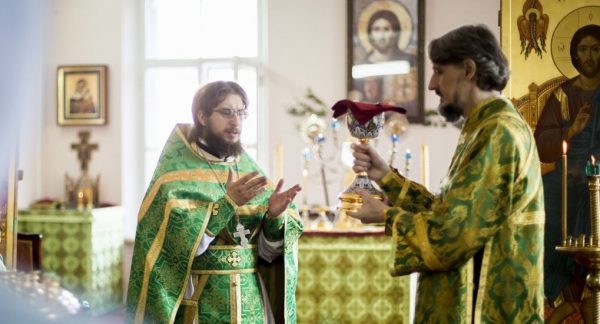Introduction
When the Russian Prince Vladimir’s emissaries visited the Church of Holy Wisdom in Constantinople, back in the 10th century, and attended the Divine Liturgy, they explained to their leader: “We knew not whether we were in heaven or on earth. One thing we understood is that God was in our midst!”
How does that experience compare to what we feel every Sunday when we come to Church and attend the Divine Liturgy? Sometimes I hear some people say “The Divine Liturgy is boring. Why do we do the same thing every week? I don’t get anything out of this type of worship.”
Well, what we do every Sunday when we gather to worship our Creator through the Divine Liturgy is encounter the living God. When we truly understand what is happening and fully prepare and then participate in the Liturgy, we do nothing less than enter into the Presence of the Living God as we take a journey into the kingdom of heaven and experience the Divine!
Why do we celebrate the same Divine Liturgy every week? What is happening in the Liturgy? Well, let us begin by talking about this journey. We go on a journey that will take us from the cares and anxieties of this present world and enter into the glory and splendor of heaven. We journey into the realm of angels and saints, into a sphere where all the righteous people who have died before us come together to worship the Almighty God. We journey not only into heaven but we also unite us with all the faithful Christians around the world, believers throughout the US along with those in Greece, Russia, Egypt, Romania, Lebanon, Palestine, Mexico, and everywhere!
Be prepared, because when the priest begins the Divine Liturgy and says, “Blessed is the Kingdom of the Father and the Son and the Holy Spirit” we enter into this mystical realm, leaving this earthly place of Sts. Constantine and Helen and entering into the eternal presence of the Holy Trinity. This is what the Divine Liturgy is all about. This is what true worship really is.
Today we are going to have a TEACHING LITURGY, where we interrupt the service at various points in order to explain what is going on. Unfortunately, some people come to the Divine Liturgy each week and don’t experience the ineffable beauty and power of this Holy Sacrament. Today’s lesson is to help us better understand, participate and experience heavenly worship.
The Divine Liturgy is the central mystery of the Church. Through this journey, we transform our gathering from a mere human gathering of people into the sacred body of Christ. Today we participate once again in the saving acts of Jesus Christ – his life, death, resurrection, ascension, enthronement in heaven, and second coming.
Unfortunately, many people come to Church, and never experience something so exciting. In order to experience such a life-transforming liturgy, we need to remind ourselves that few good things come without effort. WE NEED TO PARTICIPATE! The greatest experiences of life rarely occur without some cost. If we want to experience the fullness of the Liturgy, then we must be ready to put our whole being into the liturgy.
The Greek word “Litourgeia” means the “work of the people.” The Divine Liturgy is the holy work of the people! We come together in Church to offer divine work – to worship God with all our hearts, minds, souls and bodies.
Remember that the Liturgy is NOT a show between the priest and the choir. It is not passive entertainment during which the believers sit back and watch. It is active dialogue where we communicate and connect with the living God. The priest alone should not be doing all the activity. You as believers must put your whole being into prayer – sing, pray, bow, make your cross, lift up your hands, get involved in the physical as well as spiritual activity. Participate in the Liturgical dialogue – when the priest offers the petitions for our various needs in the world – for peace, for health, for safety – let us affirm his petition by singing with fervor “Lord Have Mercy.”
When the priest offers the petition “Remembering our Most Holy Theotokos and Ever-Virgin Mary, with all the saints, let us commit ourselves, each other and our whole life to Christ our God.” Let us respond with enthusiasm, “To You O Lord!” Through these petitions we are re-committing our lives to Jesus Christ. We are saying, “Lord Jesus Christ, to you I dedicate my entire being. It is you I serve. It is you I love. Here I am, use me for the glory of your name!”
With this little introduction, let us now begin our exciting journey into heaven. Let us stand, enter into the presence of Almighty Father, and participate in His eternal blessings!
Before the Entrance
In the early Church, there use to be much movement in the service. The
- worship began when the people gathered together outside the Church and then processed together into the sanctuary with the priest holding up the Holy Gospel and leading them.
- From this ancient ritual we get the small entrance we do today. We make an entrance holding up the Holy Word of God and all sing together “Come let us worship and bow before Christ…”
- we prepare to encounter God by entering into His house and being attentive to listen and to obey the Word of God.
After the Holy God, Before the Epistle
- In any conversation we hold with a person, there are times when we speak, and times when we listen. Liturgical dialogue with God is no different. Up to this point, we have basically offered petitions and prayers praising God and asking Him to care for our daily needs.
- Now comes the high point of the first half of the Liturgy. It is time for us to be silent and listen to the word of God. We will hear an epistle and a gospel reading. The Epistle usually comes from the letters of St. Paul, where he is explaining to us our faith. The Gospel includes words and stories from the life of Jesus Christ himself. The purpose of these words is to nourish us with divine wisdom.
- “Let us attend” the priest will say. This is not a time for us to sit down, relax and let your mind wander. It is a time to sit at the edge of your seat, waiting expectantly for divine words of guidance, nourishment, encouragement, correction and strength.
- God is speaking to us through these readings!!! St. John Chrysostom wrote, “The Scriptures were not given to us that we might have them in books, but that we might engrave them in our hearts.” These are powerful words. As you listen to the readings, ask yourself, “What is God trying to say to me? How can I apply these teachings in my life? Am I ready to follow Christ?”
- Now let us pray together the prayer on page 11 before hearing the Holy Gospel, asking the Holy Spirit to open our minds and enlighten us with divine truth. “Shine within my heart, loving Master, the pure light of your divine knowledge. . . “
After the Gospel Reading
This is the time traditionally to offer a sermon which summarizes and explains the Good News.
Before the Great Entrance and the Cherubic Hymn
- Great Entrance is the offering of the gifts of bread and wine which people in the community have offered. God takes what we offer and then blessed and transforms them and then offers them back to us. This is a reminder that all we have is God’s, and we are called to offer back to God the gifts that He has given us. We show our gratitude to God by offering back our many blessings to Him.
- We are approaching the halfway point of the Divine Liturgy. When WE SING THE CHERUBIC HYMN, we prepare ourselves for receiving our Lord’s Body and Blood in Holy Communion. The cherubic hymn says, “We (as a group of believers) mystically represent the Cherubim (the angels of heaven) and sing the thrice holy hymn (Holy, Holy, Holy) to the life giving Trinity (Father, Son and Holy Spirit).” And then listen to what it says, “LET US LAY ASIDE OUR EARTHLY CARES THAT WE MAY RECEIVE THE KING OF ALL.”
- This is the moment in the liturgy when we think about all the cares and worries of our lives and hand them over to God. What concerns did you come to church with today? What is stressing you out? What sins or mistakes are pulling your down? Confess them now and offer them to Christ. What anxieties are you thinking about for the upcoming week? Turn everything over now to our loving God and “lay aside our earthly cares” so that we may only concentrate on one thing – God Himself. We are called to offer God our complete attention at this moment! The Gospels teach us, “Seek first the Kingdom of Heaven, and all these things will be added to you.”
- This is also the time when we may pray for our loved ones, family and friends. The priest will walk around the Church and say, “MAY THE LORD OUR GOD REMEMBER US ALL IN HIS KINGDOM.” Offer your own prayer for those with whom you are concerned, both living and dead, asking God to remember them in His kingdom.
- In this way, we clear our mind of all earthly care and pray for the salvation of all people in the world, thus preparing ourselves to humbly say our Creed of Faith – words which describe, confess and proclaim what we believe!
Kiss of Peace
- Right before we say what we believe as Orthodox Christians, the priest offers the peace of God to the people, and then asks them to “let us love one another.” We cannot proceed forward in the Divine Liturgy without love for one another. In the ancient Church, at this point of the service they performed a meaningful and beautiful act – “the kiss of peace.” Everyone would turn to one another, and greet one another with “the kiss of peace,” saying “Christ is in our midst.” “He is and always shall be.” We remember the words of our Lord that when two or three are gathered in my name, He is present in their midst.
- Once we offer this sign of our love for one another, then we are in a position to publicly declare our profession of faith – what we believe as Orthodox Christians. We say a summary of our faith in the Creed that the Holy Fathers put together in the 1st and 2nd ecumenical council in the 4th century.
- Let us turn to our neighbor and offer this kiss of peace.
After the Creed and before the Holy Anaphora
- Having stated what we believe, we are now ready to make the Holy Offering. In the Old Testament, the Jews would go to the Temple and offer animal blood sacrifices to take the place of their own sins. In the Divine Liturgy, we turn to Jesus Christ, who is the perfect “lamb of God” who offers Himself as the perfect sacrifice for the entire world, taking the sins of the world upon Himself.
- This is a high point in the Liturgy when we actually participate in the Last Supper. The priest calls upon the Holy Spirit to come upon each one of us and upon the gifts offered, and together we ask that the gifts be mystically changed into the Body and Blood of our Lord Jesus Christ. This sacred mystery is something we all participate in.
- THE PRIEST ASKS THE HOLY SPIRIT to come upon the bread and wine, but when the priest says the prayer “Make this bread the precious body of your Christ” EVERY ONE OF YOU SHOULD RESPOND WITH A LOUD VOICE “AMEN.” AMEN MEANS “SO BE IT,” so you are participating in the prayer by saying that you agree, and humbly ask our Lord to change this bread and wine into His body and blood.
- Let us now pray together this consecration, and receive the Holy Spirit.
Before the Lord’s Prayer
- We have now come to the doorstep of our salvation. The gifts have been offered and accepted. We have gone through the journey of laying aside our earthly cares and calling upon the Holy Spirit, and now we are ready to receive Jesus Christ through His body and blood. But before we do that, we pray the supreme prayer of the Church – words which our Lord Himself taught us. We all know the Lord’s Prayer, and we have all recited it countless times in our lives, and yet today, let us pray it slowly and attentively, paying attention to each sentence and understanding the request of each petition.
- Following the Lord’s Prayer, we will hear the priest lift up the holy gifts and say, “LET US ATTEND, THE HOLY GIFTS ARE FOR THE HOLY PEOPLE OF GOD.” TO WHICH WE RESPOND BY SINGING, “ONE IS HOLY, ONE IS LORD.” We affirm that although the holy gifts are for the holy people, only one is holy, that one is Jesus Christ. Thus, in order for us to be holy, we must unite ourselves to Christ, become one with Him and be sanctified by His presence.
- Following this comes the moment of receiving Holy Communion. It should be obvious that the whole Liturgy leads up to the receiving of Holy Communion. OUR WORSHIP REMAINS INCOMPLETE IF WE CHOOSE NOT TO RECEIVE THE LIFE-GIVING MYSTERIES OF CHRIST’S BODY AND BLOOD.
- We should live from Holy Communion to Holy Communion, week by week. St. John Cassian wrote, “We must approach it frequently for the healing of soul and purification of the spirit.”
- When the priest says, “With the fear of God, with faith and with love draw near,” it is our invitation to receive Jesus Christ in the most powerful and meaningful way possible. Through this sacrament we receive a gift of forgiveness, of renewal, and of eternal life.
- As we approach, let us approach with sincere reverence and the proper awe that we go to be united with Jesus Christ. Let us contemplate the incomprehensible mystery of how God becomes bread and wine for us to eat and drink. And after we receive the holy Eucharist, let us NOT go back to our places talking or chatting with one another. Although the distribution of Holy Communion may take 10-15 minutes, let us be prayerful, let us be meditative, let us stand quietly offering prayers of thanksgiving for the goodness of God.
Before the Dismissal
- We have now partaken of the heavenly gifts. As the post-communion prayer stated, “We have seen the true light. We have received the heavenly spirit. We have found the true faith by worshipping the Holy Trinity who has saved us.” We have tasted salvation. We have renewed, sanctified, and set on fire our souls and are now ready to descend from our heavenly worship and enter back into our earthly existence here in Webster.
- One aspect of our journey is complete, and yet another aspect is just beginning. The liturgy isn’t over until next Sunday. Our worship and liturgy continues as we walk out the front doors. WE ARE CALLED TO LIVE THE LITURGY AFTER THE LITURGY, DO THE HOLY WORK OF GOD NOW IN THE WORLD!!!
- GOD HAS FILLED US AND NOURISHED US FOR A PURPOSE. God blesses us so that we may now go out and be a blessing for the world we live in. We are called to carry this spirit of love, this presence of God, into our homes, into Webster, and throughout the whole world, bringing the light of Christ to all people, and giving everyone an opportunity to taste of salvation.
This has been a wondrous journey we have all taken this last hour and a half. Some of us were prepared for this journey ahead of time and the experience has been wondrous. Others weren’t prepared, and I’m sorry that you didn’t get to experience the fullness of the Kingdom of God. Don’t despair, however, since we’ll have another opportunity to taste Paradise at the next Divine Liturgy. May we all prepare ourselves during this upcoming week, and be ready for another exciting journey into heaven next Sunday. Amen.
















